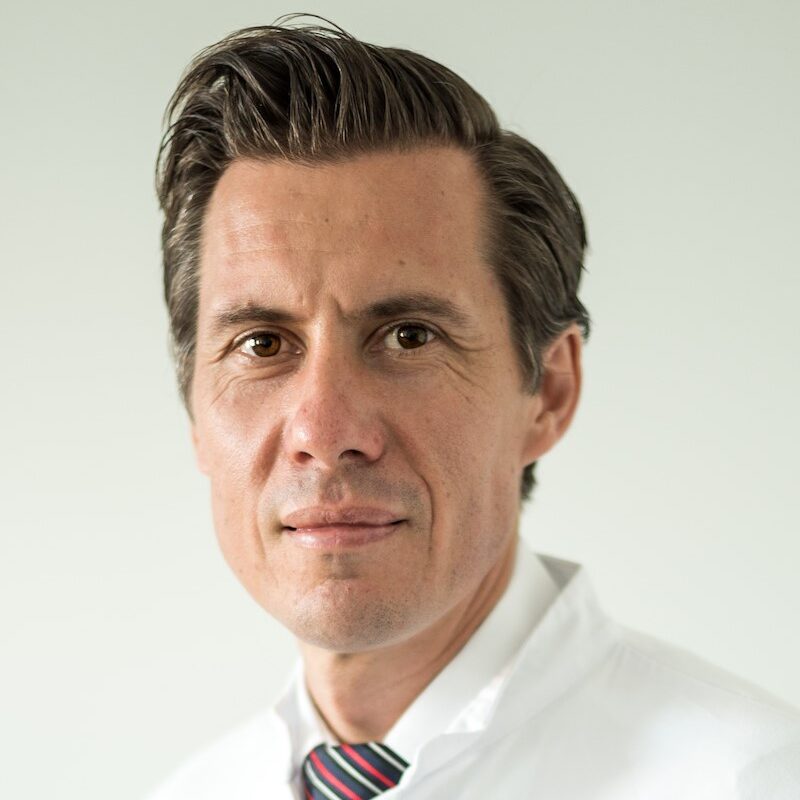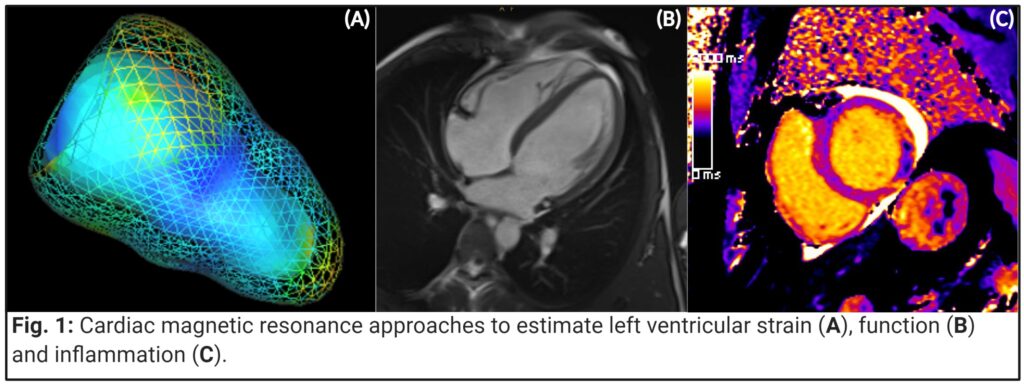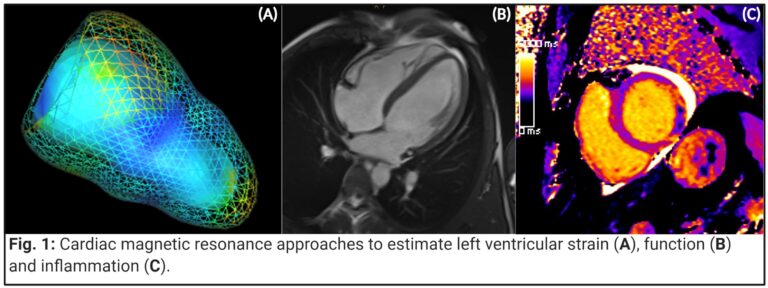
Anichstraße 35
6020 Innsbruck
Fax: +43 (0)50 504 25622
Email: Axel.Bauer@i-med.ac.at
Website: https://inneremed3.tirol-kliniken.at/
Research year
Research Branch (ÖSTAT Classification)
301109, 302006, 302030, 302032, 302071
Keywords
Acute Myocardial Infarction, angiology, atherosclerosis, biosignals, Cardiology, Cardiovascular Magnetic Resonance, Cardiovascular Regeneration, Digital and Computational Medicine, and Interventional Cardiology and Translational Clinical Research
Research Focus
The Department of Cardiology and Angiology, Internal Medicine III, conducts innovative research in cardiovascular medicine research. We specialise in acute myocardial infarction, digital medicine using biosignal analysis, artificial intelligence (AI) and scientific computing in medicine, and advanced cardiovascular imaging. We design and implement randomised academic trials that generate high-quality evidence to directly inform clinical practice.
General Facts
Since July 2019, the Department of Cardiology and Angiology at the Medical University of Innsbruck is led by Prof. Axel Bauer and combines clinical excellence with innovative cardiovascular research.
Prof. Bauer is a world-leading interventional cardiologist and clinical scientist. He has a proven track record in conducting large-scale randomised controlled trials. Since February 2024, the department has been strengthened by a new professorship in digital medicine in cardiology, held by Prof. C. Dlaska. Prof. Dlaska is a theoretical physicist and medical doctor with research experience in novel technologies ranging from AI to quantum technologies. Research activities within the department are organised into dedicated groups spanning the full spectrum from translational science to clinical research.
- Bauer’s research group focuses on the cardiac autonomic nervous system, using innovative, non-invasive biomarkers derived from ECG, blood pressure and respiratory signals. This includes biosignals derived with smart devices. The goal is to improve patient outcomes through personalised screening and treatment strategies.
- Another research group, led by Prof. B. Metzler and Assoc. Prof. S. Reinstadler, specialises in advanced cardiovascular imaging in acute myocardial infarction and valvular heart disease. The group is directly involved in investigator-initiated randomised trials and large multicentre studies.
- Dlaska’s research group is leading the way in developing AI algorithms and digital biomarkers from multimodal data to improve cardiovascular care and explores the potential of quantum technologies in healthcare.
- Translational vascular research is led by Prof. Dr. R. Kirchmair and PD Dr. M. Theurl, with a focus on vascular biology and angiogenesis.
- Research in cardiovascular repair is conducted by Assoc. Prof. Dr. MM Zaruba, aiming to develop novel regenerative strategies.
Research
Biosignal Analysis
Leader: Prof. A. Bauer, MD
Members: M. Schreinlechner, MD; T. Dolejsi, MD, PhD; F. Theurl, MD; F. Hofer, MD; D. Pavluk, MD
The working group on biosignal analysis investigates the cardiac autonomic nervous system using non-invasively recorded biomarkers such as ECG, blood pressure, respiratory activity, and oxygen saturation. These biosignals provide valuable insights into the state of the autonomic nervous system. They aim to enhance patient care through improved diagnostic and prognostic approaches. We are proud to announce that our recent projects, SMART-MI and eBRAVE-AF studies, have been published in leading international journals.
The next major initiative is the Austrian Digital Heart Program, which is supported by approximately 8 million euros in funding. This programme aims to integrate digital medicine into nationwide screening and management strategies for atrial fibrillation.
Cardiac Magnetic Resonance Imaging
Leaders: Prof. B. Metzler, MD; Assoc.-Prof. PD. SJ. Reinstadler, MD, PhD
Members: Assoc.-Prof. A. Mayr, MD; Ass.-Prof. PD. M. Reindl, MD, PhD; I. Lechner, MD, PhD; C. Tiller, MD, PhD; M. Holzknecht MD, PhD; F. Troger, MD, PhD; F. Oberhollenzer, MD; Alex Kaser, MD
The Cardiac Magnetic Resonance Imaging (CMR) working group specialises in advanced imaging techniques to investigate myocardial tissue injury and infarct healing processes in patients with ST-elevation myocardial infarction (STEMI). Another key area is CMR-guided planning for transcatheter aortic valve implantation (TAVI). The group actively participates in randomised international clinical trials and leads its own academic, randomised, multicentre studies, including the CRP-STEMI (NCT04939805), DISCHARGE-MI (NCT06744322) and TAVR-CT trials.

Cardiovascular Repair and Aging
Leaders: Prof. G. Pölzl, MD; Assoc. Prof. MM. Zaruba, MD
Members: M. Messner, MD, PhD; T. Schütz, MD; M. Ungericht, MD; André Logtenberg, MD
The Cardiovascular Repair and Aging working group is dedicated to exploring mechanisms underlying cardiovascular regeneration and the effects of aging on cardiovascular health. Their research identifies therapeutic targets that promote cardiac repair and enhance cardiovascular resilience in the aging population.
Clinical Trials in Interventional Cardiology
Leader: PD. C. Brenner, MD
The Interventional Cardiology group specialises in minimally invasive treatments for acute myocardial infarction, which have a significant impact on patient prognosis. This group maintains a comprehensive patient database to optimise clinical management and facilitate diverse clinical research studies.
Digital Cardiology
Leader: Prof. Clemens Dlaska, MD, MSc, PhD
Members: Nadja Gruber, PhD; Angus Nicolson, PhD; Riccardo Lunelli, MSc; Dipl.-Ing. Samuel Pröll;
The Digital Cardiology group conducts research at the interface between novel technologies and medicine. The group is developing AI methods for prediction and early detection of Cardiovascular diseases based on multimodal and heterogeneous clinical data. The group’s key focus is on investigating how multimodal sensors of smart devices in combination with computationally efficient AI methods can be used for screening and disease management. Another research direction is the potential application of quantum technologies in cardiovascular medicine.
Endothelial Cell Biology
Leader: Prof. R. Kirchmair, MD
Members: PD. M Theurl, MD, PhD; M Noflatscher, MD, PhD; D. Lener, B.Sc.
The Vascular Cell Biology research group investigates the molecular and cellular mechanisms of vascular biology. Recent findings demonstrated that the neuropeptide secretoneurin induces neovascularisation in cardiovascular and diabetic mouse models. These findings suggest potential therapeutic applications, especially for diabetic patients who often do not qualify for interventional or surgical revascularisation.
Experimental Electrophysiology
Leader: PD. W. Dichtl, MD
Members: PD. M. Stühlinger, MD; PD. W. Schgör, MD; PD. F. Hintringer, MD; A. Adukauskaite, PhD; P Spitaler, MD; V. Bilgeri MD
The Experimental Electrophysiology Research group primarily investigates atrial fibrillation, device therapy in heart failure and rare cardiac conditions; such as WPW syndrome, pacing-induced cardiomyopathy and Takotsubo syndrome.
Pictures
Selected Publications
Lechner I, Reindl M, Stiermaier T, Tiller C, Holzknecht M, Oberhollenzer F, von der Emde S, Mayr A, Feistritzer HJ, Carberry J, Carrick D, Bauer A, Thiele H, Berry C, Eitel I, Metzler B, Reinstadler SJ.: Clinical Outcomes Associated With Various Microvascular Injury Patterns Identified by CMR After STEMI.
J Am Coll Cardiol. 2024;83(21):2052-2062.
Reindl, Martin; Lechner, Ivan; Holzknecht, Magdalena; Tiller, Christina; Fink, Priscilla; Oberhollenzer, Fritz; von der Emde, Sebastian; Pamminger, Mathias; Troger, Felix; Kremser, Christian; Lassnig, Elisabeth; Danninger, Kathrin; Binder, Ronald K.; Ulmer, Hanno; Brenner, Christoph; Klug, Gert; Bauer, Axel; Metzler, Bernhard; Mayr, Agnes; Reinstadler, Sebastian J.: Cardiac Magnetic Resonance Imaging Versus Computed Tomography to Guide Transcatheter Aortic Valve Replacement: A Randomized, Open-Label, Noninferiority Trial.
CIRCULATION. 2023; 148(16); 1220-1230.
Reindl M, Stiermaier T, Lechner I, Tiller C, Holzknecht M, Fink P, Mayr A, Klug G, Feistritzer HJ, Delewi R, Hirsch A, Carberry J, Carrick D, Bauer A, Metzler B, Nijveldt R, Thiele H, Berry C, Eitel I, Reinstadler SJ.: Infarct severity and outcomes in ST-elevation myocardial infarction patients without standard modifiable risk factors – A multicenter cardiac magnetic resonance study
Eur J Intern Med. 2024; 119:78-83.
Lechner I, Oberhollenzer F, Tiller C, Holzknecht M, Kaser A, Binder RK, Gollmann-Tepeköylü C, Klug G, Mayr A, Bauer A, Metzler B, Reindl M, Reinstadler SJ. Age and sex-related outcomes in cardiovascular magnetic resonance versus computed tomography-guided transcatheter aortic valve replacement: a secondary analysis of a randomized clinical trial.
J Cardiovasc Magn Reson. 2025 Mar 13;27(1):101882.
Tiller C, Reindl M, Holzknecht M, Lechner I, Oberhollenzer F, von der Emde S, Kaser A, Mayr A, Pamminger M, Gollmann-Tepeköylü C, Bauer A, Metzler B, Reinstadler SJ.
Association of Intramyocardial Hemorrhage With Inflammatory Biomarkers in Patients With ST-Segment Elevation Myocardial Infarction
JACC Adv. 2025 Apr;4(4):101647.
Lechner I, Reindl M, von der Emde S, Desheva A, Oberhollenzer F, Tiller C, Holzknecht M, Kremser T, Faccini J, Gollmann-Tepeköylü C, Kremser C, Mayr A, Bauer A, Metzler B, Reinstadler SJ.
Hepatic Tissue Alterations in ST-Elevation Myocardial Infarction: Determinants and Prognostic Implications
Circ Cardiovasc Imaging. 2024 Dec;17(12):e017041.
Tiller C, Holzknecht M, Lechner I, Oberhollenzer F, von der Emde S, Kremser T, Gollmann-Tepeköylü C, Mayr A, Bauer A, Metzler B, Reinstadler SJ, Reindl M.
Association of Circulating PCSK9 With Ischemia-Reperfusion Injury in Acute ST-Elevation Myocardial Infarction
Circ Cardiovasc Imaging. 2024 Aug;17(8):e016482.
Tiller C, Reindl M, Holzknecht M, Lechner I, Troger F, Oberhollenzer F, von der Emde S, Kremser T, Mayr A, Bauer A, Metzler B, Reinstadler SJ.
Relation of plasma neuropeptide-Y with myocardial function and infarct severity in acute ST-elevation myocardial infarction
Eur J Intern Med. 2024 Aug;126:63-68.
Lechner I, Reindl M, Tiller C, Holzknecht M, Oberhollenzer F, Mayr A, Bauer A, Metzler B, Reinstadler SJ.
Culprit Lesion Vessel Size and Risk of Reperfusion Injury in ST-Segment Elevation Myocardial Infarction: A Cardiac Magnetic Resonance Imaging Study
J Am Heart Assoc. 2024 Feb 6;13(3):e033102.
Lechner I, Reindl M, Oberhollenzer F, Tiller C, Holzknecht M, Fink P, Kremser T, Bonatti P, Troger F, Henninger B, Mayr A, Bauer A, Metzler B, Reinstadler SJ.
Association of dysglycaemia with persistent infarct core iron in patients with acute ST-segment elevation myocardial infarction
J Cardiovasc Magn Reson. 2024 Summer;26(1):100996.
Lechner I, Reindl M, Tiller C, Holzknecht M, Fink P, Troger F, Angerer G, Angerer S, Henninger B, Mayr A, Klug G, Bauer A, Metzler B, Reinstadler SJ.
Temporal Trends in Infarct Severity Outcomes in ST-Segment-Elevation Myocardial Infarction: A Cardiac Magnetic Resonance Imaging Study.
J Am Heart Assoc. 2023 Aug;12(15):e028932.
Reindl M, Lechner I, Holzknecht M, Tiller C, Fink P, Oberhollenzer F, Mayr A, Troger F, Pamminger M, Henninger B, Theurl M, Klug G, Brenner C, Bauer A, Metzler B, Reinstadler SJ.
Improved detection of echocardiographically occult left ventricular thrombi following ST-elevation myocardial infarction.
Eur Heart J Acute Cardiovasc Care. 2023 Oct 25;12(10):703-710.
G. Petit*, N. Palluau*, A. Bauer, C. Dlaska, EchoDFKD: Data-Free Knowledge Distillation for Cardiac Ultrasound Segmentation using Synthetic Data, Proceedings of the IEEE/CVF Winter Conference on Applications of Computer Vision (WACV 2025)
Theurl, F.; Schreinlechner, M.; Sappler, N.; Toifl, M.; Dolejsi, T.; Hofer, F.; Massmann, C.; Steinbring, C.; Komarek, S.; Mölgg, K.; Dejakum, B.; Böhme, C.; Kirchmair, R.; Reinstadler, S.; Bauer, A.: Smartwatch-derived heart rate variability: a head-to-head comparison with the gold standard in cardiovascular disease.
EUROPEAN HEART JOURNAL – DIGITAL HEALTH. 2023; 4(3); 155-164.
Selection of Funding
- Dr. Axel Bauer and Assoc. Prof. PD. Dr. Sebastian Reinstadler: Research grant from the “Euregio Science Funds”: ~€ 1.8 million
- Dr. Axel Bauer, Assoc. Prof. PD. Dr. Sebastian Reinstadler and Dr. Michael Schreinlechner: Research grant from the “Ludwig Boltzmann Gesellschaft”: ~€ 8.0 million
- Ivan Lechner, PhD: Gesellschaft zur Förderung der Herz-Kreislauf-Forschung”; € 19,302
- Ivan Lechner, PhD: Presidential Scholarship of the “Austrian Society of Cardiology” € 50,000
Collaborations
- Prof. Dr. H. Thiele, University of Leipzig, Germany
- Prof. Dr. I. Eitel, University of Lübeck, Germany
- Prof. Colin Berry, University of Glasgow, United Kingdom.
- Prof. Robin Nijveldt, Radboud University Medical Center, Nijmegen, Netherlands
- Prof. Dr. G. Schmidt, Technische Universität München, München, Germany
- Prof. Dr. M. Zabel, Universitätsmedizin Göttingen, Göttingen , Germany
- Prof. Marek Malik, Cardiac and Vascular Sciences, St. George’s, University of London, London, United Kingdom
- Prof. Wojciech Zareba, Heart Research Follow-up Program, University of Rochester, Rochester , USA
- Prof. Dr. H. Huikuri, Tampere University Hospital, Tampere, Finland
- German Center for Cardiovascular Research (DZHK), Germany
